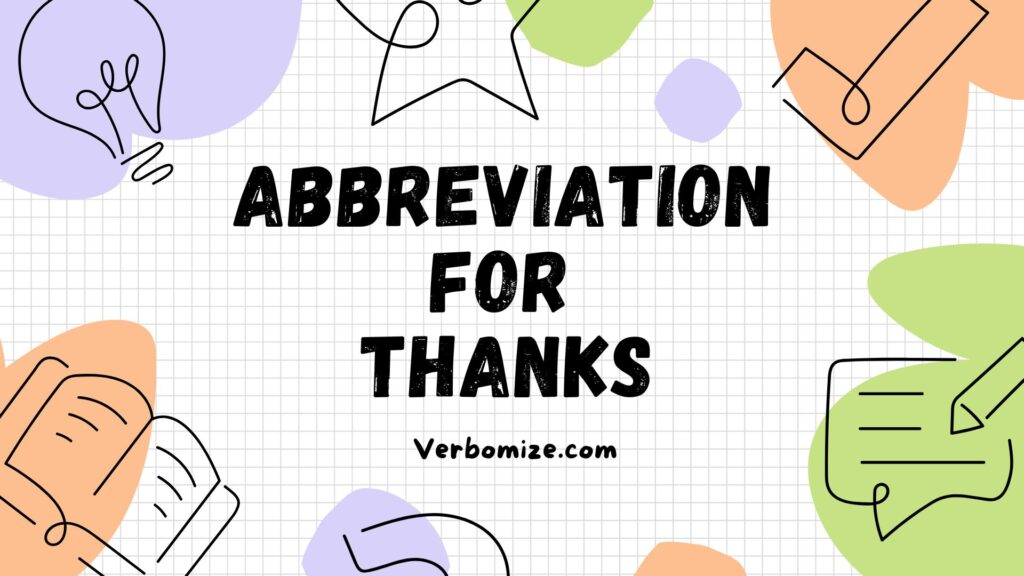“Abbreviation for Thanks” – it’s something you’ve likely seen countless times in texts, emails, and online chats. But do you know what it really means and how to use it? With communication becoming faster and more casual, shorthand like this has become essential in our daily conversations.
In this article, we’ll dive into the world of abbreviations, focusing on “thanks” and how this little shortcut can save you time while still showing appreciation. Curious? Keep reading to discover the best way to use it and why it’s more than just a trend!
What is the Abbreviation for Thanks?
The most common abbreviation for “thanks” is “Thx”, though there are a few other variations that are also widely used in digital communication. These include “TY”, “Tks”, and sometimes even “Thnx”. These abbreviations have become a staple in texting, social media, and informal email conversations. They help people save time and space while still expressing gratitude, particularly in fast-paced digital environments.
Common Abbreviations for Thanks:
- Thx – The most popular and widely used abbreviation.
- TY – Shortened form of “thank you.”
- Tks – Another variation often used in text messages and social media.
- Thnx – A less common, but still recognizable shorthand for “thanks.”
Each of these abbreviations conveys the same sentiment of gratitude, though they might be used in slightly different contexts depending on the level of formality and the medium of communication.
The Meaning Behind “Thx”
While abbreviations like “Thx” save time and space, their meaning remains fundamentally the same as the full word “thanks” – a polite expression of gratitude or acknowledgment. These shortened forms don’t diminish the intent behind the message; they just provide a quicker way to communicate.
However, you might wonder whether “Thx” carries the same emotional weight as the full word “thanks.” In casual communication, such as text messages between friends, “Thx” works just as well to express appreciation. But in more formal settings, like emails to colleagues or business communications, using the full form “thanks” or “thank you” can sound more respectful and professional.
Contexts of “Thx”: When and Where It’s Used
Casual Communication
In everyday conversations with friends and family, “Thx” is common and widely accepted. Texting, instant messaging, and social media platforms like Twitter and Facebook have made abbreviations for thanks a part of digital communication. The speed of communication in these spaces often calls for shorthand versions of words, and “Thx” serves this purpose well.
Examples:
- Text message: “Thx for the gift!”
- Social media comment: “Thx for the follow!”
Professional Communication
In more formal settings, such as business emails or work chats, using “Thx” can be seen as overly casual or even dismissive. “Thank you” or “Thanks” should be preferred in these situations to maintain a professional tone.
Examples:
- Email: “Thank you for your prompt response.”
- Work chat: “Thanks for helping with that report.”
Social Media Communication
On social media, “Thx” is often used by influencers, brands, and individuals alike. Whether responding to comments, acknowledging a compliment, or thanking followers for support, abbreviations like “Thx” help keep the communication quick and casual.
Examples:
- Twitter: “Thx for all the birthday wishes!”
- Instagram post: “Thx for the love, everyone!”
A Brief History of the “Thx” Abbreviation
The use of “Thx” as a shorthand for “thanks” likely traces back to the early days of SMS (Short Message Service) texting when character limits constrained the length of messages. Early mobile phones had a maximum of 160 characters per message, which meant that people had to find ways to condense their messages while still conveying meaning.
Over time, as digital communication evolved with the rise of instant messaging apps and social media, the practice of abbreviating common words like “thanks” became second nature. “Thx” emerged as a quick and efficient way to express gratitude in texts and online chats, particularly when typing on small mobile keyboards.
Pronunciation and Variations of “Thx”
While “Thx” is widely understood in text form, it’s less clear how it’s pronounced. Most people would still pronounce it like the full word “thanks”, with some dropping the “k” sound for a quicker pronunciation: “Thx” might sound like “thuhks” or simply “thx” in fast conversation.
There are also different variations of “Thx” depending on personal preference or regional speech patterns:
- “TX” – Often used for Texas, but can sometimes be a shorthand for thanks in informal settings.
- “Thnx” – A variation that can still be used informally but is slightly less common than “Thx.”
Common Alternatives to “Thx”
TY (“Thank You”)
Another common abbreviation is “TY”, which stands for “thank you.” It’s more formal than “Thx” and can be used in both casual and slightly more formal settings. “TY” is particularly popular in online gaming, social media, and among younger people in casual communication.
Tks (“Thanks”)
Less common than “Thx” but still widely used, “Tks” is a simple, straightforward abbreviation for “thanks” that’s often seen in text messages and online posts. It tends to be used more in the context of a quick reply or when typing speed is a priority.
Emojis as Alternatives
Emojis have also become a popular alternative to text abbreviations, including for expressing gratitude. For example:
- 👍 – A simple thumbs-up emoji can convey appreciation without typing a word.
- 🙏 – The “folded hands” emoji is commonly used to express gratitude, particularly in social media posts and messages.
Examples of “Thx” in Different Contexts
Personal Communication (Friends, Family, and Texting)
When texting with friends or family, using “Thx” is a quick, friendly way to show appreciation. Since these conversations are informal, abbreviations are expected and often even preferred.
Examples:
- “Thx for helping me with my groceries!”
- “Thx, I’ll see you at the meeting tomorrow.”
Social Media Usage
On social media, “Thx” is often used to acknowledge followers, thank people for comments, or express appreciation for a particular post or gesture. Given the fast-paced nature of social media, using abbreviations helps people keep up with the volume of messages and comments.
Examples:
- “Thx for the birthday wishes, everyone! You all rock!”
- “Thx for sharing my post!”
The Rise of Digital Communication: Why Abbreviations Matter
The Role of Social Media and Instant Messaging
As social media platforms like Twitter, Facebook, and Instagram grew in popularity, so did the need for quick communication. These platforms, along with SMS texting, played a significant role in popularizing abbreviations like “Thx” and “TY.” With character limits on early mobile phones and the desire for quick exchanges, abbreviating words like “thanks” became a natural fit.
Instant Gratitude: Expressing Thanks Efficiently
In a world where time is often limited, digital communication thrives on brevity. Using abbreviations for gratitude like “Thx” or “TY” allows individuals to express appreciation without slowing down the flow of conversation.
The Power of Saying “Thanks” (or Abbreviating It)
Whether you’re using “Thx” or the full “thanks,” expressing gratitude has a powerful impact. Studies show that gratitude can improve mental well-being and strengthen relationships. Even a simple “Thx” can go a long way in building positive social connections, whether between friends, family, or coworkers.
Gratitude and Its Psychological Impact
Gratitude is linked to positive emotions, increased happiness, and reduced stress. When you express thanks, even in abbreviated form, you’re fostering a sense of acknowledgment and appreciation, which benefits both the giver and receiver.
Is “Thx” Enough? The Importance of Tone and Context
While “Thx” can be an efficient and polite way to acknowledge someone, it’s important to consider the tone and context. In some situations, especially in professional or formal communication, a more detailed expression of gratitude (e.g., “Thank you so much for your help”) may be more appropriate.
When to Use Abbreviations Like “Thx” and “TY”
Appropriate vs. Inappropriate Situations
It’s crucial to understand when it’s appropriate to use abbreviations like “Thx” and “TY”. For example:
- Use “Thx” in informal texts or social media posts with friends, family, or close colleagues.
- Avoid “Thx” in formal business emails, presentations, or situations requiring professional tone.
Etiquette in Both Casual and Formal Settings
The key to using “Thx” or similar abbreviations is knowing your audience. If you’re unsure about how informal you can be, it’s always safer to spell out “thanks” or “thank you.”
Other Synonyms and Expressions of Gratitude
- “Cheers” – A casual expression of thanks commonly used in British English.
- “Much appreciated” – Often used in a slightly more formal context.
- “Grateful” – A more formal word to express thanks.
- “Appreciate it” – A laid-back way to show gratitude for someone’s help or kindness.
Antonyms of “Thanks”
Not every interaction requires gratitude. Some responses can be seen as antonyms to “thanks,” such as:
- “No problem” – Used to indicate that the action performed didn’t require effort.
- “Don’t mention it” – A common response to express that the act was insignificant.
Final Thoughts: Should You Use “Thx”?
In conclusion, the abbreviation for thanks, whether it’s “Thx”, “TY”, or “Tks”, has become a staple of digital communication. While abbreviations help improve communication efficiency, it’s important to consider context, tone, and audience. In informal settings, “Thx” works perfectly, but in more formal or professional contexts, using the full expression of thanks may be more appropriate.
Ultimately, the key is to know when and where to use abbreviations and when a full expression of gratitude might be necessary.

Jone Smith is an experienced blogger and content creator behind Verbo Mize. With a passion for storytelling and insightful commentary, Jone brings a wealth of knowledge on diverse topics. His expertise in blogging, combined with a keen eye for detail, makes his work both informative and engaging, offering readers valuable perspectives on a wide range of subjects.







